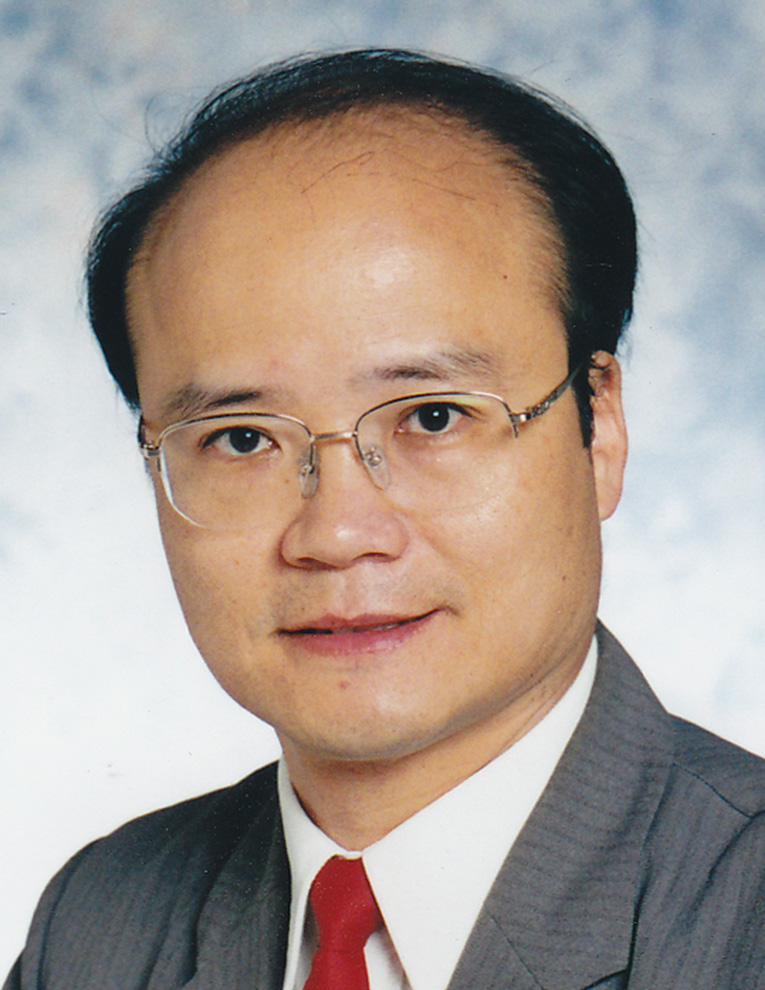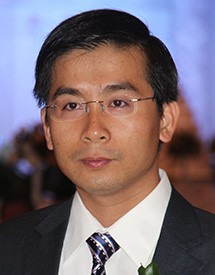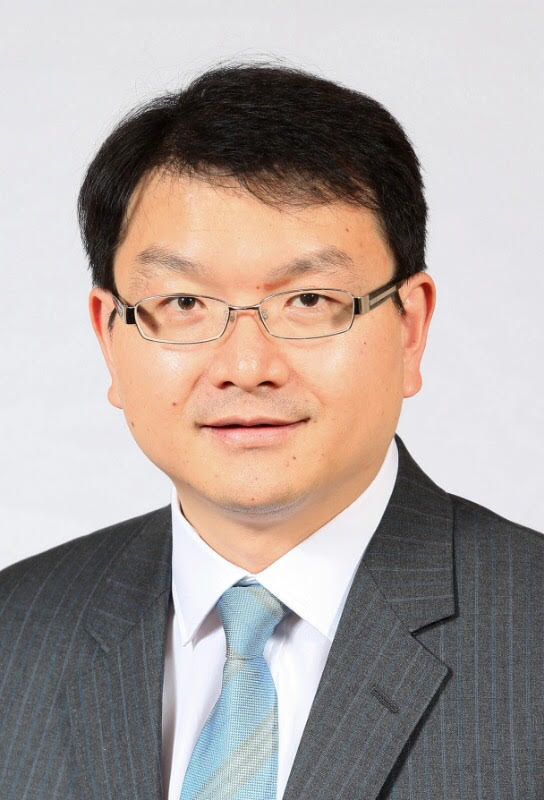DTMTDCS 2024
July 23-26, 2024
Jersey City, New Jersey, USA
Keynote Speakers for DTMTDCS 2024



Abstract: Digital Twin (DT) has been widely envisioned as a major intelligent application of 6G wireless networks in creating highly real-time and reliable wireless-connected environments to support efficient interactions and interplays between physical and virtual objects. On the other hand, DT has been widely recognized as a promising 6G wireless technique to efficiently realize the practical implementation of metaverse featured by various powerful virtual realities. As a digital representation of an intended real-world physical object, a DT needs to be timely and reliably updated by and synchronized with the corresponding physical systems. As a result, the stringent quality-of-service (QoS) guaranteed mobile wireless networks play the crucial role in efficiently supporting DT's systems designing and performance modeling and analyses. Correspondingly, a large number of 6G wireless techniques have been identified and developed to enable the QoS-provisioning for implementing and supporting DT's. However, how to efficiently integrate the various advanced 6G wireless techniques for supporting DT's QoS guarantees over 6G mobile networks has imposed many new open-problems/issues not encountered before. To conquer these challenges, a great deal of efforts have been made in developing various 6G key promising-candidate techniques in terms of principle, theory, architecture, protocol, technologies, etc. Towards the above ends, in this tutorial I will address a number of QoS-Driven 6G Wireless Techniques for efficiently supporting DT mobile networks, which include: (1) Statistical-QoS theory; (2) massive Ulrta-Low Latency Communications (mURLLC); (3) Metaverse, VR, and XR; (4) Integrated Sensing, and Communications (ISAC); (5) Multi-Tier Computing; (6) Finite Blocklength Coding (FBC); (7) Wireless Caching; (8) massive-MIMO; (9) network functions virtualization (NFV); (10) information-centric network (ICN); (11) software defined networks (SDN); (12) Full Duplex (FD); (13) Device-to-Device (D2D), (14) mmWAVE; (15) THz + NANO Networks, (16) AI + ML, etc. and how these techniques can be integrated to efficiently support the statistical delay and error-rate bounded QoS provisioning for supporting/implementing DT over 6G mobile wireless networks. Furthermore, we will also discuss several future research directions, obstacles, and open problems in the general areas for 6G mobile wireless networks.
BIO: Xi Zhang (IEEE Fellow) received the B.S. and M.S. degrees from Xidian University, Xi'an, China, the M.S. degree from Lehigh University, Bethlehem, PA, USA, all in electrical engineering and computer science, and the Ph.D. degree in electrical engineering and computer science (Electrical Engineering-Systems) from The University of Michigan, Ann Arbor, MI, USA.
He is currently a Full Professor and the Founding Director of the Networking and Information Systems Laboratory, Department of Electrical and Computer Engineering, Texas A&M University, College Station, TX, USA. He is a Fellow of the IEEE for contributions to quality of service (QoS) theory in mobile wireless networks. He was with the Networks and Distributed Systems Research Department, AT&T Bell Laboratories, Murray Hill, NJ, USA, and AT&T Laboratories Research, Florham Park, NJ, in 1997. He was a Research Fellow with the School of Electrical Engineering, University of Technology, Sydney, Australia, and the Department of Electrical and Computer Engineering, James Cook University, Australia. He has published more than 400 research articles on wireless networks and communications systems, network protocol design and modeling, statistical communications, random signal processing, information theory, and control theory and systems. He received the U.S. National Science Foundation CAREER Award in 2004 for his research in the areas of mobile wireless and multicast networking and systems. He received six Best Paper Awards at IEEE GLOBECOM 2020, IEEE ICC 2018, IEEE GLOBECOM 2014, IEEE GLOBECOM 2009, IEEE GLOBECOM 2007, and IEEE WCNC 2010, respectively. One of his IEEE JOURNAL ON SELECTED AREAS IN COMMUNICATIONS papers has been listed as the IEEE Best Readings Paper (receiving the highest citation rate among all IEEE TRANSACTIONS/Journal articles in the area) on wireless cognitive radio networks and statistical QoS provisioning over mobile wireless networking. He is an IEEE Distinguished Lecturer of the IEEE Communications Society and the IEEE Vehicular Technology Society. He received the TEES Select Young Faculty Award for Excellence in Research Performance from the Dwight Look College of Engineering at Texas A&M University, College Station, TX, in 2006, and the Outstanding Faculty Award from Texas A&M University, in 2020.
Professor Zhang is serving or has served as an Editor for IEEE TRANSACTIONS ON COMMUNICATIONS, IEEE TRANSACTIONS ON WIRELESS COMMUNICATIONS, IEEE TRANSACTIONS ON VEHICULAR TECHNOLOGY, IEEE TRANSACTIONS ON GREEN COMMUNICATIONS AND NETWORKING, and IEEE TRANSACTIONS ON NETWORK SCIENCE AND ENGINEERING, twice as a Guest Editor for IEEE JOURNAL ON SELECTED AREAS IN COMMUNICATIONS for two special issues on "Broadband Wireless Communications for High Speed Vehicles" and "Wireless Video Transmissions", an Associate Editor for IEEE COMMUNICATIONS LETTERS, twice as the Lead Guest Editor for IEEE Communications Magazine for two special issues on "Advances in Cooperative Wireless Networking" and "Underwater Wireless Communications and Networks: Theory and Applications", a Guest Editor for IEEE Wireless Communications Magazine for special issue on "Next Generation CDMA vs. OFDMA for 4G Wireless Applications", an Editor for Wiley's JOURNAL ON WIRELESS COMMUNICATIONS AND MOBILE COMPUTING, JOURNAL OF COMPUTER SYSTEMS, NETWORKING, AND COMMUNICATIONS, and Wiley's JOURNAL ON SECURITY AND COMMUNICATIONS NETWORKS, and an Area Editor for Elsevier's JOURNAL ON COMPUTER COMMUNICATIONS, and among many others. He is serving or has served as the TPC Chair for IEEE GLOBECOM 2011, TPC Vice-Chair for IEEE INFOCOM 2010, TPC Area Chair for IEEE INFOCOM 2012, Panel/Demo/Poster Chair for ACM MobiCom 2011, General Chair for IEEE ICDCS 2024 Workshop on "Digital Twin-Enabled 6G Multi-Tier Distributed Computing Systems", General Chair for IEEE WCNC 2013, and TPC Chair for IEEE INFOCOM 2017-2019 Workshops on "Integrating Edge Computing, Caching, and Offloading in Next Generation Networks", etc.

Abstract: The future generation of wireless communications requires the stringent quality-of-service (QoS) requirements in terms of very high data rate, ultra-high success reception rate, and minimal latency. Supported by high QoS wireless communications, digital twin has become a game-changing technology in many applications including smart city, manufacturing, automotive, gaming, entertaining, and climate resilience. Edge computing-based wireless ultra-reliable and low-latency communications (URLLC) in 6G has been considered as a key technique to realise the full potential of digital twin. This talk discusses a joint communications and computation design of URLLC multi-tier computing in 6G that supports digital twin networks, not only fundamental requirements, but also enabling technologies, visions, and future challenges.
BIO: Dr. Trung Q. Duong (IEEE Fellow) is a Canada Excellence Research Chair and Full Professor at Memorial University of Newfoundland, Canada. He is a Research Chair of the Royal Academy of Engineering and an adjunct Chair Professor in Telecommunications at Queen’s University Belfast, UK. His current research interests include quantum optimisation and machine learning in wireless communications. He has published 500+ books/bookchapters/papers with 18,000+ citations and h-index 74. He has served as an Editor for many reputable IEEE journals (IEEE Trans on Wireless Communications, IEEE Trans on Communications, IEEE Trans on Vehicular Technology, EEE Communications Surveys & Tutorials, IEEE Communications Letters, and IEEE Wireless Communications Letters) and has been awarded best paper awards in many flagship conferences including IEEE ICC 2014, IEEE GLOBECOM 2016, 2019, and 2022. He is the recipient of the Research Fellowship (2015-2020) and Research Chair (2020-2025) of the Royal Academy of Engineering. In 2017, he was awarded the Newton Prize from the UK government. He is a Fellow of IEEE and a Fellow of Asia-Pacific Artificial Intelligence Association (AAIA).

Abstract: Large AI models have emerged as a crucial element in various intelligent applications at the network edge, such as voice assistants in smart homes and autonomous robotics in smart factories. Computing big AI models, e.g., for personalized fine-tuning and continual serving, poses significant challenges to edge devices due to the inherent conflict between limited computing resources and intensive workload associated with training. Despite the constraints of on-device training, traditional approaches usually resort to aggregating data and sending it to a remote cloud for centralized computation. Nevertheless, this approach is neither sustainable, which strains long-range backhaul transmission and energy-consuming datacenters, nor safely private, which shares users’ raw data with remote infrastructures. To address these challenges, we alternatively observe that prevalent edge environments usually contain a diverse collection of trusted edge devices with untapped idle resources, which can be leveraged for edge training acceleration. Motivated by this, iwn this talk, we propose to leverage edge collaboration, a novel mechanism that orchestrates a group of trusted edge devices as a resource pool, for expedited, sustainable large AI model computing at the edge. As an initial step, we present a comprehensive framework for building collaborative edge computing systems and analyze in-depth its merits and sustainable scheduling choices following its workflow. To further investigate the impact of its parallelism design, we empirically study a case of four typical parallelisms from the perspective of energy demand with realistic testbeds. Finally, we discuss open challenges for sustainable edge collaboration to point to future directions of edge-centric large AI model computing.
BIO: Yang Yang received the B.S. and M.S. degrees in radio engineering from Southeast University, Nan jing, China, in 1996 and 1999, respectively, and the Ph.D. degree in information engineering from the Chinese University of Hong Kong, Hong Kong, in 2002. He is currently the Associate Vice-President for Teaching and Learning, Acting Dean of College of Education Sciences, and a Professor with the IoT Thrust with the Hong Kong University of Science and Technology, Guangzhou, China. Before joining Hong Kong University of Science and Technology (Guangzhou), he has held Faculty positions with the Chinese University of Hong Kong, Brunel University, London, U.K., University College London, London, U.K., and Shanghai Institute of Microsystem and Information Technology, Chinese Academy of Sciences, Shanghai, China. He has authored coauthored more than 280 papers and filed more than 80 technical patents in his research interests which include fog computing networks, service-oriented collaborative intelligence, wireless sensor networks, IoT applications, and advanced testbeds and experiments. Since January 2019, he has been the Chair of the Steering Committee of Asia-Pacific Conference on Communications (APCC). He is also a General Co-Chair of IEEE DSP 2018 conference and TPC Vice-Chair of IEEE ICC 2019 conference.